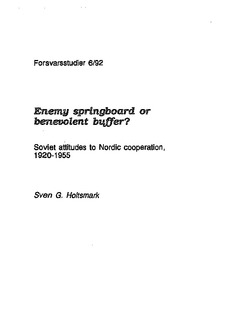| dc.contributor.author | Holtsmark, Sven G. | |
| dc.date.accessioned | 2011-03-29T09:58:16Z | |
| dc.date.available | 2011-03-29T09:58:16Z | |
| dc.date.issued | 1992 | |
| dc.identifier.uri | http://hdl.handle.net/11250/99539 | |
| dc.description | It is often assumed that the Soviet Union consistently opposed Nordic military cooperation from the early 1920s to the mid 1950s. This study argues that the Soviet position was much more complex and fluid, partly due to the existence of conflicting traditions within the Soviet foreign policy establishment. While a negative attitude predominated Soviet policy, an alternative approach took a positive stand towards Nordic cooperation. The alternative approach was based on a more optimistic view of the smaller states’ ability and will to act independently on the international scene.
The present study is based on Soviet sources and documents, including materials from the archives of the Russian Ministry of Foreign Affairs and the former Communist Party of the Soviet Union. | en_US |
| dc.language.iso | eng | en_US |
| dc.publisher | Institutt for forsvarsstudier | en_US |
| dc.relation.ispartofseries | Forsvarsstudier;6 | |
| dc.subject | Sovjetunionen | en_US |
| dc.subject | Forsvarspolitikk | en_US |
| dc.subject | Norden | en_US |
| dc.subject | Militært samarbeid | en_US |
| dc.title | Enemy springboard or benevolent buffer? | en_US |
| dc.type | Others | en_US |
| dc.source.pagenumber | 91 s. | en_US |
